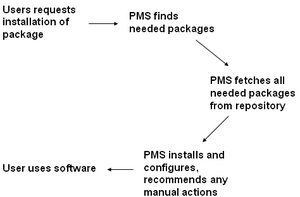Self Correcting OS
February 17th, 2007[ Linux ]
 I’m impressed, Fedora just fixed itself. If you’re not familiar with linux based OS’s then you may not have used a package management system. Basically they manage the applications you install and the OS itself. So instead of having find a download on the interweb, download it, install it, reboot etc. You just find the application in a list and select it. The PM does the rest of the dirty work for you.
I’m impressed, Fedora just fixed itself. If you’re not familiar with linux based OS’s then you may not have used a package management system. Basically they manage the applications you install and the OS itself. So instead of having find a download on the interweb, download it, install it, reboot etc. You just find the application in a list and select it. The PM does the rest of the dirty work for you.
There are several PM’s out there to choose from as well as many different repositories that they draw on. Making installation painless is cool. The slick part is keeping your OS AND all your applications up to date and working. This is something that I know windows does not do and I’ve read that Apple isn’t doing either, however, don’t know that first hand. What I’ve read is that Apple does it but only for their apps but not third-party.
When I built my fedora desktop I managed to hose up my video drivers. I got things working but not entirely smoothly. There were some kinks that I knew I’d introduced. I turned my machine off last night for the first time in well over a week. When I turned it on today it found updates and pulled them down and in the process completely repaired the kinks I’d introduced.
Sure it’s not the linux way and I should have had to type “sudo rpm -i lsjlkjfj lskjdf” a few more times but in the end it just worked. So far my experience with Ubuntu’s PM has been nothing but lovely as well.
“Ubuntu shines in this aspect thanks to the centralized packaging of software. Given that all available applications are packaged by the developers and put in a common server, the apt package manager is able to automatically update all of your installed packages to the latest available versions. This also includes keeping track of added dependencies so that an update will not (generally) break any of the existing stuff. In some sense, you can consider that there is no “core OS”: once a new program is installed from the repository, it is integrated into the OS in such a way that it is indistinguishable.” [link]
